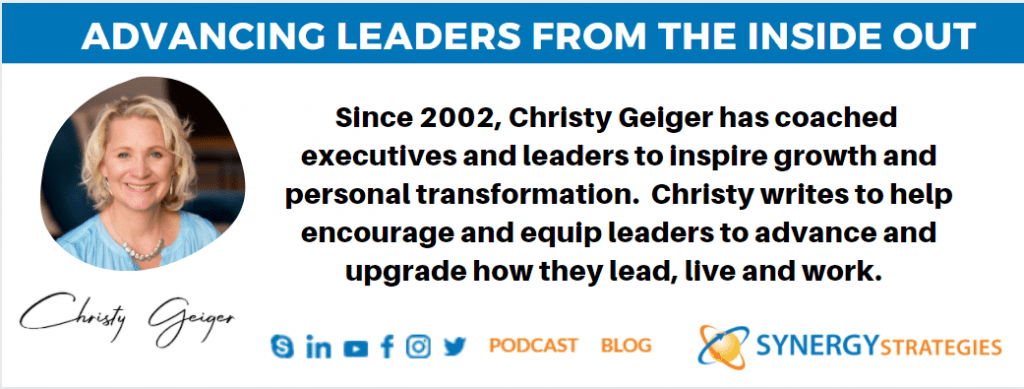Do you want to accomplish more with your life? Do you feel that you have great potential untapped up inside of you but can’t quite fully get there? Many people feel this way. Marcus Buckingham, who has done extensive research on strengths, disparages the use of the word potential because if can cause people to feel discouraged about a never-ending quest rather than living their strengths today. The reality is as humans we don’t ever truly reach our full potential because as we upskill our potential also increases. It is perhaps a little like a mirage that is always ahead of you but never quite attainable. The “mirage” of your potential is not a negative illusion however, it can be a catalyst and vision to your capability and possibility. If we allow ourselves to be discouraged about reaching it, we never scratch the surface of our potential staying stagnant and complacent. When we see it and strive for it, we grow, improve and advance. It is worth it and does make a difference. Someone striving for their potential is farther ahead anyway than someone who has given up on achieving their potential. Are you ready to find out what you can do?
To stay on the quest of maximizing your potential:
-
- Be bold. This is the number one tip for unleashing your potential on the world. Fear and timidity hold us back and keep us in a lot of head chatter rather than vision and action. We all have moments like this. Often it is an indicator of our Achilles heel, something that challenges a value, threatens our status or security, and stops us in our tracks assessing if it is worth the risk, work, and vulnerability. The problem is without walking on this unpaved path, we cannot find new places and cap our growth to what we know. Learning is on the other side of risk and failure. Our evolving and progressing potential is on the other side of risk and boldness. You’ve got this. Take calculated risks, have a sounding board, check your thinking and limited thinking, know your why, and press forward.
- Have audacious goals. To live up to your potential, you must have goals. Goals give direction for your energy and effort. Effective goals provide clarity, focus, and a plan for the action that needs to be taken. Watch out for overwhelming yourself. Goals should be bold and aggressive but not overwhelming. Set your goal and then outline a few (like 3-5 milestones) and then get in action. Overwhelm often happens when people try to map a goal to the finish line. They get stuck because they can’t see the finish line from the starting line. When people try to outline steps all the way to the finish line, they become paralyzed by the unknown and uncertainty and stop pursuing the goal because of the mystery and wait until it is clearer. The problem is clarity of the finish line is only visible as you are down the path of the goal. You must start to finish.
- Combine your strengths and interests. Focus on what you are naturally good at and gravitate to. I like to say what you are passionate about, however, some people have a hard time identifying their passion because it feels like it should be something great already. Don’t worry about that, just think what do you do that you lose track of time when doing? What comes easy for you and doesn’t for others? What do you tend to give others advice on? If you have 30min of free time, what do you find yourself curious about? What do you pause on when you are scrolling the internet (that is productive)? You have the most potential in the areas of your natural strength and interest. Focus on these things and you will see the 10x start to happen because it is easy and effortless for you.
- Have an inner circle and sounding board. Leading experts in the world have a coach or mentor. The right mentor can help you to reach your potential faster than you can do it alone. If we could see our own blind spots, they would not be blind spots. Our family at times can help us with this, but it is harder to separate their feedback because it is often intertwined in their desire for you and how your actions intersect with their life. A neutral person is additionally useful because they are unattached to your daily success or failure so they can sit in the helicopter with you to assess and give honest feedback that supports your goals and potential. Spend the time necessary to find a good mentor. It’s like putting your progress on the fast track.
- Take a step every day. A small amount of progress, accumulated over time, can result in amazing progress. One page written in a book each day is a 365-page book in a year. Thirty minutes a day on removing a toleration will clear out the toleration list by the end of the year. Avoid overwhelming yourself by setting a schedule or goals that you can’t maintain (ie 3 hours of tolerations a day). The key is simply time and a clear step to make progress each day. The amount of progress you can make in a year would be staggering.
- Habits help you accomplish your goals. Reaching your potential is directly related to making progress and achieving your goals. Most people have very busy lives with many things demanding their time and energy. Your goals will fall on the backburner unless you develop a system to ensure your goals make the daily priorities. Atomic Habits is a fantastic book with tons of tips like habit stacking, to help ensure you have daily routines that support goal achievement. If you leave it to willpower, I guarantee it will fall off your radar quickly. That is why most New Year’s resolutions fail. A system and structure that support daily habits help to keep you accountable and on autopilot for these critical daily action steps. An effective set of habits will guarantee success (there is more, but if you are doing habits, you will be farther along to the goal than if you don’t have them). Note: The hardest part is often creating and designing habits that work. Once the right habits are in place, you can build on those. Make sure to measure and assess along the way.
- Identify obstacles. When doing goal planning, one of the best things you can do is to identify what obstacles might get in the way of achieving that goal. We often plan goals ambitiously and optimistically. This is great and if you can plan with any obstacles in mind, you will be steps ahead when those blocks show up! Consider time, money, resources, and what it takes to achieve the goal and realistic things that might stand in the way. Take steps to overcome those possible barriers.
- Expect success. If we plan to fail, we will. Success is more than just crossing the finish line. Success is every step along the way. Success is setting the goal, planning the goal, and each baby step toward the goal. Of course, success is achieving the goal, but celebrate the wins and victories along the way. This will help to build momentum and energy to be a catalyst to cross the finish line! Doubt and questions happen as we pursue anything ambitious and especially things that take us to our greater levels of potential. To get there you will have to go through conscious incompetence, and this is a desert of mystery and unknowns. Don’t let this stop you, focus on the successes and wins each day to keep you on the path to the larger win.
Seeing your potential and strengths, setting goals, acting boldly, and surrounding yourself with structures to support your mission will help you unlock your potential. Today is the day; make it happen!






